一般现在时讲解
- 格式:docx
- 大小:17.07 KB
- 文档页数:4
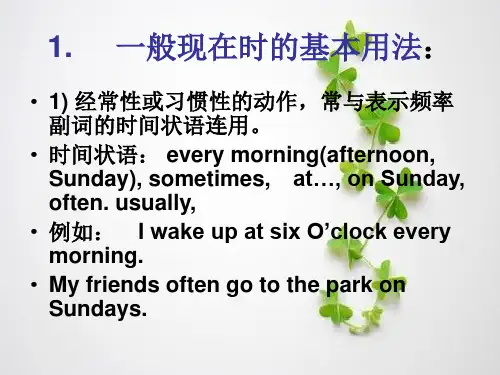
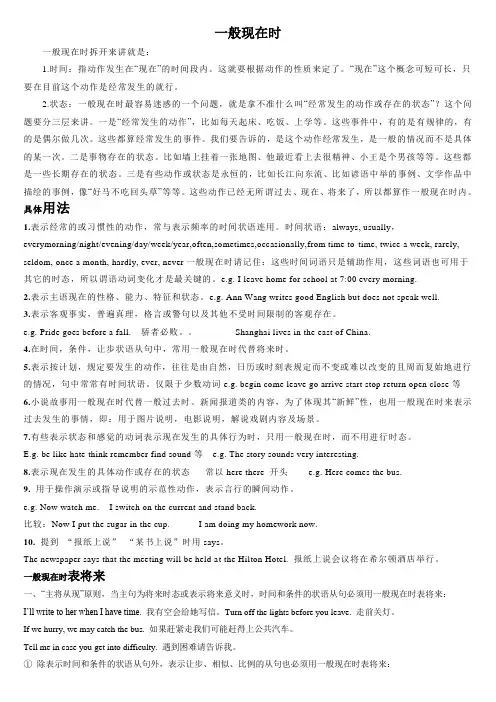
一般现在时一般现在时拆开来讲就是:1.时间:指动作发生在“现在”的时间段内。
这就要根据动作的性质来定了。
“现在”这个概念可短可长,只要在目前这个动作是经常发生的就行。
2.状态:一般现在时最容易迷惑的一个问题,就是拿不准什么叫“经常发生的动作或存在的状态”?这个问题要分三层来讲。
一是“经常发生的动作”,比如每天起床、吃饭、上学等。
这些事件中,有的是有规律的,有的是偶尔做几次。
这些都算经常发生的事件。
我们要告诉的,是这个动作经常发生,是一般的情况而不是具体的某一次。
二是事物存在的状态。
比如墙上挂着一张地图、他最近看上去很精神、小王是个男孩等等。
这些都是一些长期存在的状态。
三是有些动作或状态是永恒的,比如长江向东流、比如谚语中举的事例、文学作品中描绘的事例,像“好马不吃回头草”等等。
这些动作已经无所谓过去、现在、将来了,所以都算作一般现在时内。
具体用法1.表示经常的或习惯性的动作,常与表示频率的时间状语连用。
时间状语:always, usually,everymorning/night/evening/day/week/year,often,sometimes,occasionally,from time to time, twice a week, rarely, seldom, once a month, hardly, ever, never一般现在时请记住:这些时间词语只是辅助作用,这些词语也可用于其它的时态,所以谓语动词变化才是最关键的。
e.g. I leave home for school at 7:00 every morning.2.表示主语现在的性格、能力、特征和状态。
e.g. Ann Wang writes good English but does not speak well.3.表示客观事实,普遍真理,格言或警句以及其他不受时间限制的客观存在。
e.g. Pride goes before a fall.骄者必败。
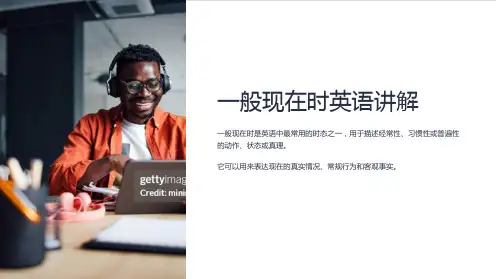
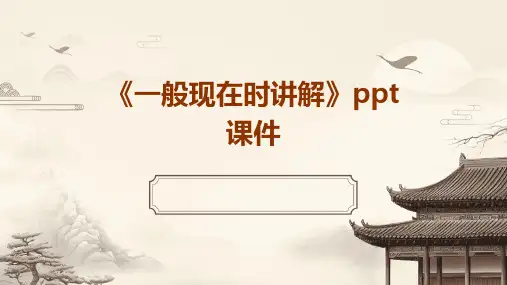

一般现在时态讲解公司内部档案编码:[OPPTR-OPPT28-OPPTL98-OPPNN08]一般现在时态讲解一般现在时(de)用法:1.表示经常性、习惯性(de)动作或存在(de)状态.eg. I go to school on foot. He is very busy now.2.表示主语(de)特征、性格、能力、爱好等.eg. He can swim. I work hard. I like watching TV.3.表示客观真理 eg. There are seven days in a week. 否定句:主语+be+not+其他 eg. Danny is not a good student. 一般疑问句:Be+主语+其他 eg. Is Danny a good student(2)句中有实意动词,如work, go, get, help, study, play 等表示主语(de)动作肯定句:主语+谓语动词+其他 eg. I work hard at school.否定句:主语+don’t 或doesn ’t+谓语动词原形+其他 eg. I don’t work hard at school.疑问句:Do 或Does + 主语+ 动词原形+其他 eg. Do I work hard at school . They have lunch at 12:00.They don’t have lunch at 12:00. Do they have lunch at 12:00注意:单数第三人称做主语时,谓语动词要用单三形式,变否定句须在动词前加助动词doesn’t;变一般疑问句须在句首加助动词does.. Jenny speaks English very well.Jenny doesn’t speak English very well. Does Jenny speak English very well动词第三人称单数(de)变化规则如下: (1)直接在动词词尾加-s.ask---asks work---works get---gets stay---stays play — plays like — likes(2)以字母s, x, ch, sh 或o 结尾(de)动词,在词尾直接加-es.watch---watches wish---wishes fix---fixesdo---does go---goes pass---passes(3)以“辅音字母加 - y”结尾(de)动词,要先变y 为i 再加-es. try---tries study---studies cry---cries fly---flies (4)不规则变化: have----has一般现在时态(de)时间状语为often、 usually、 always、 sometimes等频率副词,on Saturdays、 in the morning(afternoon evening) 、every day 等.常见错误:be动词与实意动词同时出现在句子中例:We are plant (plant) the trees in spring.(误)正解:We plant (plant) the trees in spring.解析:在英语中,be是表状态,do是表动作,两种动词不能同时出现在句子中,可记住如下口诀:“英汉语言有差异,be 、do不能放一起,仔细琢磨细分析,语法千万要牢记.”一般现在时态练习一般现在时态(de)时间状语为often、 usually、 always、 sometimes,on Saturdays、 in the morning/afternoon/ evening 、every day、every week 等.I.用所给词(de)正确形式填空1. We often___________(play) on the playground.2. He _________(get) up at six o’clock everyday.3. __________you _________(brush) your teeth every morning4. What____ (do) he usually _____(do) after school5. Danny _______(study) English, Chinese, Math, Science and Art atschool.6. Mike sometimes __________(go) to the park with his sister.7. At eight at night, she ________(watch) TV with his parents. 8. ________ Mike________(read) English every day9. How many lessons ______your classmate_______(have) on Monday10. What time _______his mother_________(do) the housework11. He often ______(have) dinner at home.12. Daniel and Tommy________ (be) in Class One.13. We___________________ (not watch) TV on Monday.14. Nick _____________________(not go) to the zoo on Sunday.15. They___________ (like) the World Cup16. What ______they often __________(do) on Sat urdays17. Your parents___________ (read) newspapers every day.18. The girl___________ (teach) us English on Sundays.19. She and I _____________(take) a walk together every evening.20.There____________(be) somewaterin the bottle.21. Mike _____________(like) cooking.22.They____________(have) the same hobby.23. My aunt_____________ (look) after her baby carefully.24. Youalways__________(do) yourhomeworkwell.25. I___________ (be) ill. I’m staying in bed.26.She_________(go) to school from Monday toFriday.27. Liu Tao _________(do) not like PE.28. Thechildoften___________ (watch) TV in the evening.29. Su Hai andSuYang _________(have) eight lessons thisterm.30. -What day _________(be) it today -It’s Saturday.31. Don’t make a noise. Grandpa __________________(sleep).32. Tom’s family__________(watch) TV.33. ---What ______ your mother _______(do) every evening---She _______(wash) clothes.34. _______ it______(rain)every day35. --What _______ you _______(do) on Sundays --We ________ (play) football.36. There ________ (be) a football match on TV every morning.37. They often ________ (visit) the Gre at Wall.38. He _____________ (not come).39. The earth __________ (move) round the sun.40.Mr. Wang often______( go) to Shanghai.Π. 以My School Life为题写一篇小短文,不少于60词.__________________________________________________________________ __________________________________________________________________ __________________________________________________________________ __________________________________________________________________ __________________________________________________________________ __________________________________________________________________ __________________________________________________________________ __________________________________________________________________ __________________________________________________________________ ______________________________________________________。

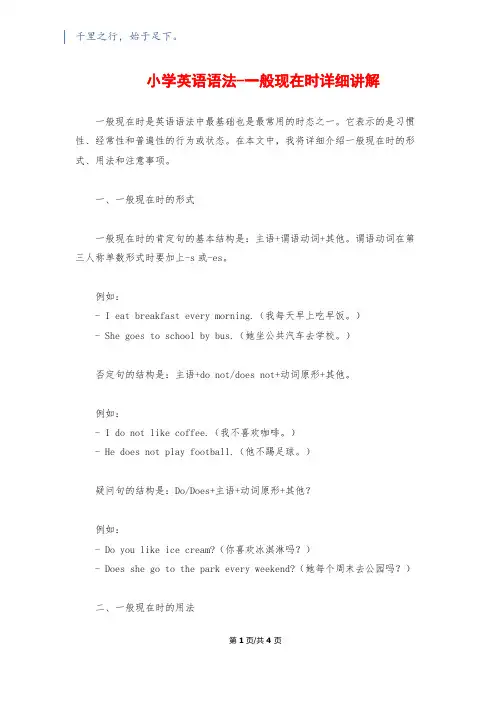
小学英语语法-一般现在时详细讲解一般现在时是英语语法中最基础也是最常用的时态之一。
它表示的是习惯性、经常性和普遍性的行为或状态。
在本文中,我将详细介绍一般现在时的形式、用法和注意事项。
一、一般现在时的形式一般现在时的肯定句的基本结构是:主语+谓语动词+其他。
谓语动词在第三人称单数形式时要加上-s或-es。
例如:- I eat breakfast every morning.(我每天早上吃早饭。
)- She goes to school by bus.(她坐公共汽车去学校。
)否定句的结构是:主语+do not/does not+动词原形+其他。
例如:- I do not like coffee.(我不喜欢咖啡。
)- He does not play football.(他不踢足球。
)疑问句的结构是:Do/Does+主语+动词原形+其他?例如:- Do you like ice cream?(你喜欢冰淇淋吗?)- Does she go to the park every weekend?(她每个周末去公园吗?)二、一般现在时的用法第1页/共4页1. 表示习惯或经常性的动作:- I write in my diary every night.(我每天晚上写日记。
)- They play basketball every Sunday.(他们每个星期天打篮球。
)2. 表示客观事实、自然规律或科学真理:- Water boils at 100 degrees Celsius.(水在100摄氏度时煮沸。
)- The sun rises in the east.(太阳从东方升起。
)3. 表示感觉、想法和喜好:- I love chocolate.(我喜欢巧克力。
)- He hates to wake up early.(他讨厌早起。
)4. 表示现时状态或现时临时的动作:- I am a student.(我是一个学生。
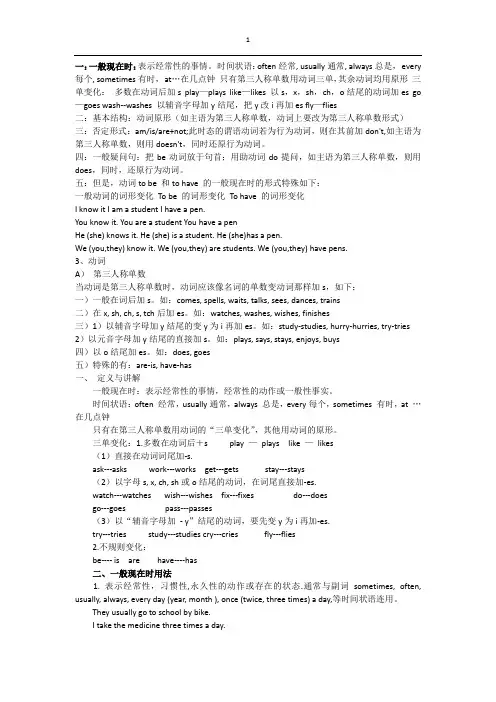
一:一般现在时:表示经常性的事情。
时间状语:often经常, usually通常, always总是,every 每个, sometimes有时,at…在几点钟只有第三人称单数用动词三单,其余动词均用原形三单变化:多数在动词后加s play—plays like—likes 以s,x,sh,ch,o结尾的动词加es go —goes wash--washes 以辅音字母加y结尾,把y改i再加es fly—flies二:基本结构:动词原形(如主语为第三人称单数,动词上要改为第三人称单数形式)三:否定形式:am/is/are+not;此时态的谓语动词若为行为动词,则在其前加don't,如主语为第三人称单数,则用doesn't,同时还原行为动词。
四:一般疑问句:把be动词放于句首;用助动词do提问,如主语为第三人称单数,则用does,同时,还原行为动词。
五:但是,动词to be 和to have 的一般现在时的形式特殊如下:一般动词的词形变化To be 的词形变化To have 的词形变化I know it I am a student I have a pen.You know it. You are a student You have a penHe (she) knows it. He (she) is a student. He (she)has a pen.We (you,they) know it. We (you,they) are students. We (you,they) have pens.3、动词A)第三人称单数当动词是第三人称单数时,动词应该像名词的单数变动词那样加s,如下:一)一般在词后加s。
如:comes, spells, waits, talks, sees, dances, trains二)在x, sh, ch, s, tch后加es。
如:watches, washes, wishes, finishes三)1)以辅音字母加y结尾的变y为i再加es。
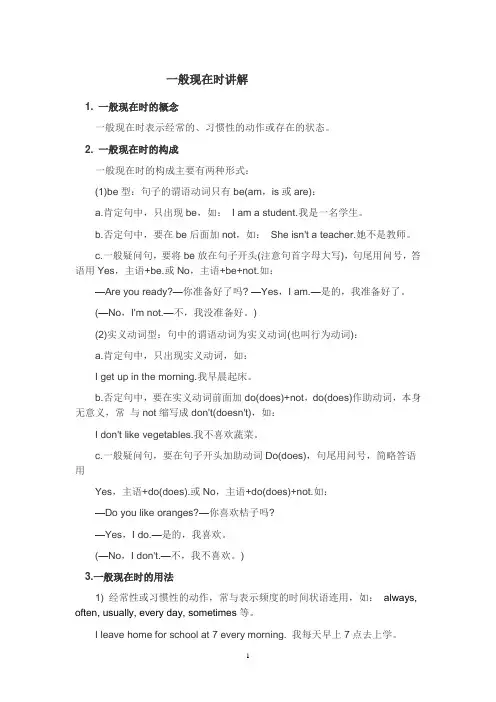
一般现在时讲解1. 一般现在时的概念一般现在时表示经常的、习惯性的动作或存在的状态。
2. 一般现在时的构成一般现在时的构成主要有两种形式:(1)be型:句子的谓语动词只有be(am,is或are):a.肯定句中,只出现be,如:I am a student.我是一名学生。
b.否定句中,要在be后面加not,如:She isn't a teacher.她不是教师。
c.一般疑问句,要将be放在句子开头(注意句首字母大写),句尾用问号,答语用Yes,主语+be.或No,主语+be+not.如:—Are you ready?—你准备好了吗? —Yes,I am.—是的,我准备好了。
(—No,I'm not.—不,我没准备好。
)(2)实义动词型:句中的谓语动词为实义动词(也叫行为动词):a.肯定句中,只出现实义动词,如:I get up in the morning.我早晨起床。
b.否定句中,要在实义动词前面加do(does)+not,do(does)作助动词,本身无意义,常与not缩写成don't(doesn't),如:I don't like vegetables.我不喜欢蔬菜。
c.一般疑问句,要在句子开头加助动词Do(does),句尾用问号,简略答语用Yes,主语+do(does).或No,主语+do(does)+not.如:—Do you like oranges?—你喜欢桔子吗?—Yes,I do.—是的,我喜欢。
(—No,I don't.—不,我不喜欢。
)3.一般现在时的用法1) 经常性或习惯性的动作,常与表示频度的时间状语连用,如:always, often, usually, every day, sometimes等。
I leave home for school at 7 every morning. 我每天早上7点去上学。
2) 客观真理,客观存在,科学事实。

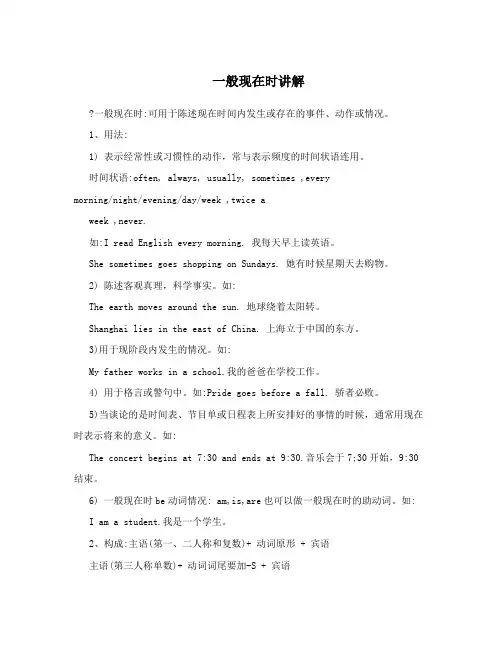
一般现在时讲解一般现在时:可用于陈述现在时间内发生或存在的事件、动作或情况。
1、用法:1) 表示经常性或习惯性的动作,常与表示频度的时间状语连用。
时间状语:often, always, usually, sometimes ,everymorning/night/evening/day/week ,twice aweek ,never.如:I read English every morning. 我每天早上读英语。
She sometimes goes shopping on Sundays. 她有时候星期天去购物。
2) 陈述客观真理,科学事实。
如:The earth moves around the sun. 地球绕着太阳转。
Shanghai lies in the east of China. 上海立于中国的东方。
3)用于现阶段内发生的情况。
如:My father works in a school.我的爸爸在学校工作。
4) 用于格言或警句中。
如:Pride goes before a fall. 骄者必败。
5)当谈论的是时间表、节目单或日程表上所安排好的事情的时候,通常用现在时表示将来的意义。
如:The concert begins at 7:30 and ends at 9:30.音乐会于7;30开始,9:30结束。
6) 一般现在时be动词情况: am,is,are也可以做一般现在时的助动词。
如:I am a student.我是一个学生。
2、构成:主语(第一、二人称和复数)+ 动词原形 + 宾语主语(第三人称单数)+ 动词词尾要加-S + 宾语3、动词变单三的规则:(1)一般在动词词尾直接加-S。
如:buy--buys;drive—drives;run--runs以o/s/x/sh/ch结尾的动词词尾加-es。
如:do—does;fix—fixes;watch--watches (2)(3)以“辅音字母+y”结尾的动词把y变成i,再加-es。
英语一般现在时讲解一般现在时:表示经常性或习惯性发生的动作,或存在的状态,即发生在现在,并且难以判断起止状态的动作或状态。
构成方式:动词be、have和行为动词用原形;主语为单数第三人称时,谓语动词也要相应地变成第三人称单数。
1、一般现在时的用法:当不带感情色彩地叙述现在发生的动作本身时,用一般现在时。
(1)用于叙述现阶段经常性或习惯性的动作,常与often, always, sometimes, every day, on Sundays等表示频度的时间状语连用。
例:I have breakfast at 7 every morning.我每天早晨7点吃早餐。
例:I go swimming on Sundays.每周日我都去游泳。
(2)表示现阶段存在的状态、特征或心理活动。
例: I like fruits.我喜欢水果。
(3)用于叙述客观事实或真理。
例:The Thames flows through London.泰晤士河穿过伦敦。
例:The sun rises in the east and sets in the west.太阳东升西落。
(4)表示主语具备的性格、能力和特征。
例:They speak English very well.他们英语说得很好。
例:This taxi driver knows the city of Beijing like the back of his hand.这位出租司机对北京城了如指掌。
(5)表示计划安排好的将来动作,也可用一般现在时,但只限于:go, come, leave, start, begin, arrive, be等动词。
例:The plane takes off at 11 a.m.飞机上午11点起飞。
例:We leave Beijing next month.我们下月离开北京。
例:He comes back tonight.他今晚回来。
(6)在时间、条件状语从句中,用一般现在时代替一般将来时。
千里之行,始于足下。
学校英语语法_一般现在时具体讲解一般现在时(Simple Present Tense)是英语中最基本的时态之一,用来表达经常性或习惯性的动作、客观事实、常规活动等。
以下是一般现在时的具体讲解。
1. 构成:主语 + 动词原形(第三人称单数要在动词后加-s)+ 其他。
例如:- I play soccer on weekends.(我周末踢足球。
)- He watches TV every evening.(他每天晚上看电视。
)2. 主语:一般现在时的主语可以是第一人称、其次人称或第三人称。
例如:- I go to school every day.(我每天去上学。
)- You like ice cream.(你宠爱冰淇淋。
)- She plays the piano well.(她弹得很好。
)3. 动词的变化:- 第三人称单数一般在动词后面加上-s或-es。
例如:he/she/itplays(he plays,she plays,it plays),he/she/it watches(he watches,she watches,it watches)。
- 一般现在时的否定形式是在动词前面加上do not(don’t)或does not(doesn’t)。
例如:I do not dance(我不跳舞),She does not like coffee(她不宠爱咖啡)。
- 一般现在时的疑问形式是把do或does放在主语前面。
例如:Do you play tennis?(你打网球吗?),Does she go to the gym?(她去健身房吗?)4. 使用场景:第1页/共2页锲而不舍,金石可镂。
- 表达经常性或习惯性的动作。
例如:I eat breakfast every morning.(我每天早上吃早餐。
)- 表达客观事实、普遍真理等。
例如:The sun rises in the east.(太阳从东方升起。
小学一般现在时讲解一、什么是一般现在时?一般现在时是用来表示现在发生的动作、惯、事实,以及经常、通常发生的动作或状态。
二、一般现在时的结构和用法一般现在时的结构为主语+谓语动词(原形)+其他成分。
常用的谓语动词有:work, go, play等。
以下是一般现在时的几种常见用法:1. 表示客观真理或普遍事实- The sun rises in the east.(太阳从东方升起。
)- Water boils at 100 degrees Celsius.(水在100摄氏度沸腾。
)2. 表示经常性的动作或惯- I usually go to bed at 10 p.m.(我通常在晚上10点睡觉。
)- He often plays soccer with his friends.(他经常和朋友们踢足球。
)3. 表示现阶段的情况或状态- She lives in New York.(她住在纽约。
)- We have two cats.(我们有两只猫。
)4. 表示固定的时间表、日程安排或时间表的安排- Class starts at 9 a.m.(课程在早上9点开始。
)- The train arrives at 8:45.(火车在8点45分到达。
)三、一般现在时的注意事项1. 第三人称单数的主语在一般现在时中的动词形式要加上-s或-es。
- She works in a hospital.(她在医院工作。
)- He brushes his teeth every morning.(他每天早上刷牙。
)2. 在否定句和疑问句中需要使用助动词do/does,并将动词改为原形。
- They don't like vegetables.(他们不喜欢蔬菜。
)- Does he play the piano?(他会弹钢琴吗?)四、小练请根据下列句子中的动词填写所缺的动词形式(原形/第三人称单数形式):1. I ___________ (study) English every day.2. Tom ___________ (go) to school by bike.3. Lucy ___________ (watch) TV in the evening.4. They ___________ (play) soccer on weekends.5. The cat ___________ (sleep) in the sun.答案:1. study2. goes3. watches4. play5. sleeps以上就是关于小学一般现在时的讲解。
一、一般现在时态1、一般现在时态的概念(1)、表示现在的状态(谓语多用系动词be)(2)、表示经常或习惯性的动作(谓语是do类动词)(3)、表示主语具备的性格和能力(谓语多是speak like enjoy)2、be (am is are)“是”,英语中最重要的一个系动词。
do类动词,又叫实义动词。
例如:have (有),play(玩,打)等。
3、一般现在时态的动词形式一般现在时态规定:系动词be用现在式am is are 三个形式。
do 类动词用原型或第三人称单数形式。
“原形动词+ s / es”构成“第三人称单数形式”,与单数名词变复数名词方法一样。
(1)、一般情况,动词后直接加s例如:brings 带来calls 打电话meets 遇见needs 需要(2)、以字母e结尾的动词,直接加s (读/ z /)例如:Likes 喜欢takes 带走(3)、以字母s x ch sh o结尾的动词,加es例如:does 做goes 走,去watches 观看(4)、以“辅音字母+ y”结尾的名词,变y为i,加es例如:stud y →studies 学习(思考:enjoy play have的第三人称单数形式是)4 、一般现在时态主语与谓语动词的搭配第一人称单数主语:I +am 或V原形he she itthis that第三人称单数主语单数名词不可数名词+ is ; V单三形式动词不定式动名词We you they复数主语these those + are ; V原形复数名词本块习题:用所给词的正确形式填空1、I _______ ( have ) a soccer ball .2、She ______ ( have ) two __________ ( pingpong—ball ) .3、He ______ ( play ) sports every day .4、We ______ ( speak ) English .5、Tom ______ ( call ) Jim every day .6、My daughter ______ ( like ) apples .7、His ______ ( friend ) knows English .8、The girl ______ ( study ) English sometimes .9、The _______ ( boy ) often watch TV .10、Her uncle ______ ( go ) home on foot 。
一般现在时讲解及练习来源:学而思英语网文章作者:学习 2010-07-03 14:27:14[标签:一般现在时]一、定义与讲解一般现在时:表示经常性的事情,经常性的动作或一般性事实。
时间状语:often 经常,usually通常,always 总是,every每个,sometimes 有时,at …在几点钟只有在第三人称单数用动词的“三单变化”,其他用动词的原形。
三单变化:1.多数在动词后+s play —plays like —likes(1)直接在动词词尾加-s.ask---asks work---works get---gets stay---stays(2)以字母s, x, ch, sh或o结尾的动词,在词尾直接加-es.watch---watches wish---wishes fix---fixes do---doesgo---goes pass---passes(3)以“辅音字母加- y”结尾的动词,要先变y为i再加-es.try---tries study---studies cry---cries fly---flies2.不规则变化:be---- is are have----has二、一般现在时用法1. 表示经常性,习惯性,永久性的动作或存在的状态.通常与副词sometimes, often, usually, always, every day (year, month ), once (twice, three times) a day,等时间状语连用。
They usually go to school by bike.I take the medicine three times a day.She helps her mother once a week.Mary’s father is a policeman.There are 50 students in my class.2. 表示客观真理,科学原理,自然现象,等客观事实或格言,谚语等。
The sun rises in the east and sets in the west every day.The man who has never been to the Great Wall is not a real man.Tomorrow is Tuesday.三、一般现在时的句子转换:(1)当句子中有be动词或情态动词时,则把be动词或情态动词(can,could等等)提到主语的前面变成疑问句;在be动词或情态动词后面加not变成否定句.例:①陈述句:She is a student.疑问句→ Is she a student?否定句→ She is not a student.②陈述句:I can swim.疑问句→ Can you swim否定句→ I can not swim.(2)当句子中即没有be动词,也没有情态动词时,则在主语前加助动词do (you,以及复数), doe s(单数she,he,it)变成问句;在主语后谓语动词前加助动词don’t(I,you,以及复数), doesn’t(单数she, he,it)变成否定句,助动词后的动词要变成动词原形。
例:①陈述句:We get up at 7:00 every morning.疑问句→Do you get up at 7:00 every morning?否定句→We don’t get up at 7:00 every morning.②陈述句:She has a little brother.疑问句→ Does she have a little brother?否定句→ She doesn’t have a little brother.(一).用动词的适当形式填空1. She _________(go) to school at seven o’clock.2. It’s 6o’clock. They are _________ (eat) supper.3. He usually ___________ up at 17:00.(get )4. She ___________ (live) in Beijing.5. Amy _________ (be) here just now.6. _______ (be)there a fly on the table just now?7. My father __________ (watch) TV every evening .8. My father _______________ (make) toys these days.9.?________ Amy _________ (read) English every day10. Chen Jie sometimes _________(go)to the park with her sister.(二).选择填空1.I want____homework now. A. doing B. to do C. to do my D. do my2.It's time______.A. go to schoolB. play gamesC. to go homeD. to do my homeworks3.______go and help her. A. Let's me B. Let's us C. Let's D. Let's to4.Do they have a new car? Yes,_____.A .they are B.they have C. they don't D. they do5.He often _________ supper at 6:00 in the evening.A. haveB. has c. is having D. is eating6. We _____________ any Chinese classes on Friday.A. are havingB. aren’t havingC. don’t haveD. are have(三)、用括号内动词的适当形式填空。
1. He often _________ (have) dinner at home.2. Daniel and Tommy _________ (be) in Class One.3. We _________ (not watch) TV on Monday.4. Nick_________ (not go) to the zoo on Sunday.5. they _________ (like) the World Cup?6. What they often_________ (do) on Saturdays?7. your parents _________ (read) newspapers every day?8. The girl _________ (teach) us English on Sundays.9. She and I _________ (take) a walk together every evening.10. There _________ (be) some water in the bottle.11. Mike_________ (like) cooking.12. They _________ (have) the same hobby.13. My aunt _________ (look) after her baby carefully.14. You always _________ (do) your homework well.15. I _________ (be) ill. I’m staying in bed.16. She _________ (go) to school from Monday to Friday.17. Liu Tao _________ (do) not like PE.18. The child often _________ (watch) TV in the evening.19. Wang Kai and Wang li_________ (have) eight lessons this term.20. -What day _________ (be) it today? -It’s Saturday.1. We often___________(play) in the playgound.2. He _________(get) up at six o’clock.3. __________you _________(brush) your teeth every morning.4. What __________(do) he usually (do) after school?5. Danny__________(study) English,Chinese,Maths,Science and Art an school.6. Mike sometimes __________(go) to the park with his sister.7. At eight at night, she __________(watch) TV with his parents.8. ________ Mike________(read) English every day?9. How many lessons_________your classmate________(have) on Monday?10.What time_________his mother_________(do) the housework?1. Do you often play football after school? (肯定回答)2. I have many books. (改为否定句)3. Gao Shan’s sister likes playing table tennis (改为否定句)4. She lives in a small town near New York. (改为一般疑问句)5. I watch TV every day. (改为一般疑问句)6. David has got a goal. (改为一般疑问句)7. We have four lessons.(否定句)8. Nancy doesn’t run fast (肯定句)9. My dog runs fast. 否定句:一般疑问句:10. Mike has two letters for him.一般疑问句:否定句:11. I usually (play football )on Friday afternoon.否定句: 一般疑问句:括号内容提问12. Su Yang usually washes some clothes on Saturday. 否定句:一般疑问句:划线提问:13. Mingming usually waters the flowers every day否定句:一般疑问句:划线提问14. Tom does his homework at home.否定句:一般疑问句:划线提问。